William Oughton 1852-1905.
Team man, Shopkeeper, Coal Merchant, Grocer, Draper, Baker, Trustee of the Primitive Methodist Chapel and Parish Councillor.
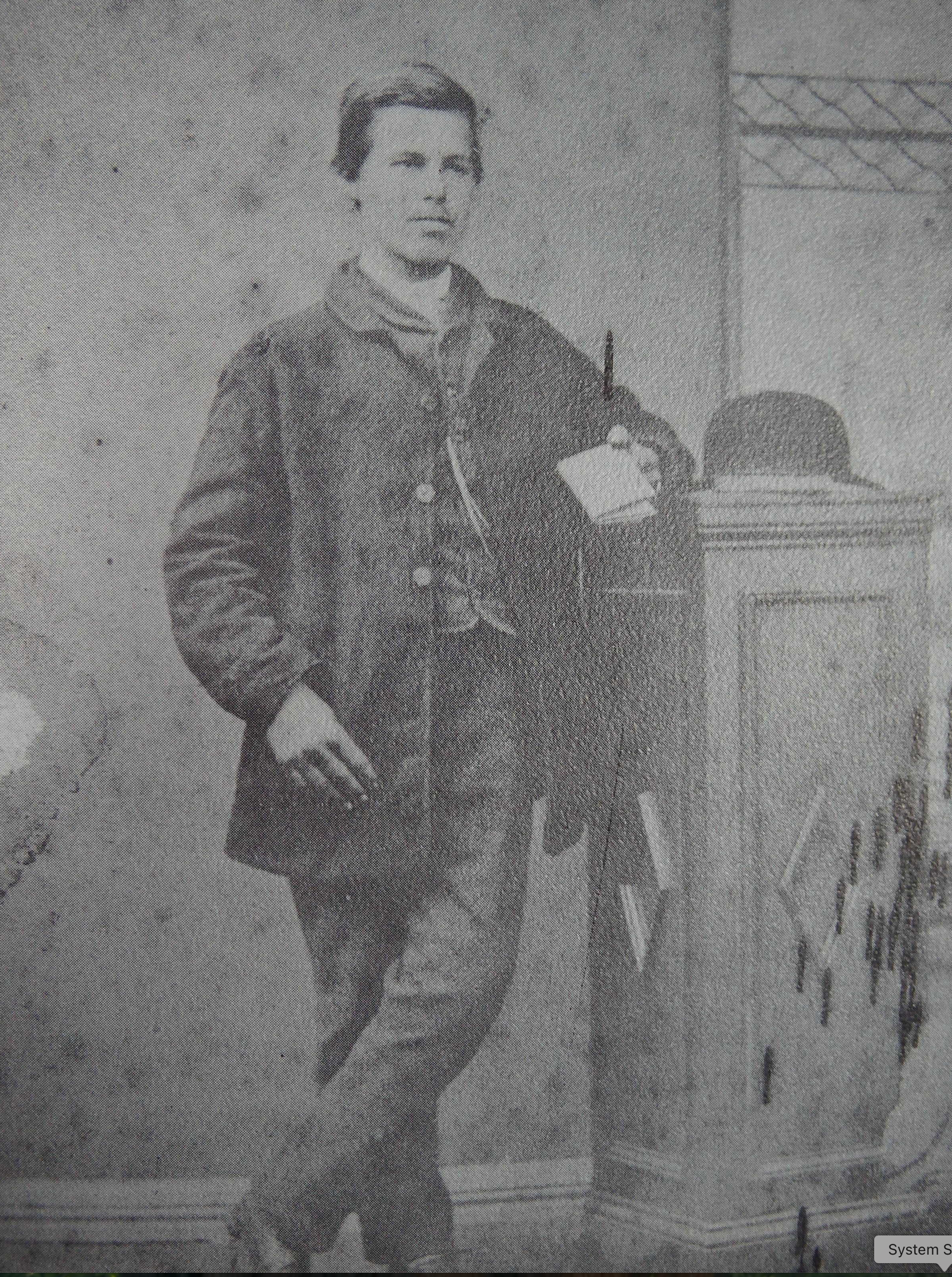
William Oughton was the 3rd surviving son of that name born to William Oughton and Sophia Curson in 1852. They had married at St Andrew’s on the 19th August 1832. and lived much of their early married life in Little Ryburgh. William (Jnr.) was the only boy of their 8 surviving children, born on July 5th 1852 and baptised at St Andrew’s on August 8th that year. He would have attended the school at Great Ryburgh, although I can find no reference to him in the earliest Log Book which begins in 1862. An older sister E. Oughton is mentioned over six pages from February to July 1863 as “assisted in lower class by”.
E. could have either been 23 year old Elizabeth who went on to marry John Jex the following year, or more likely 13 year old Emma who died on 12th November 1863 when William was 11 years of age. A modest head and foot stone mark the site of her burial in front of the South wall of the ruin of All Saints Little Ryburgh:
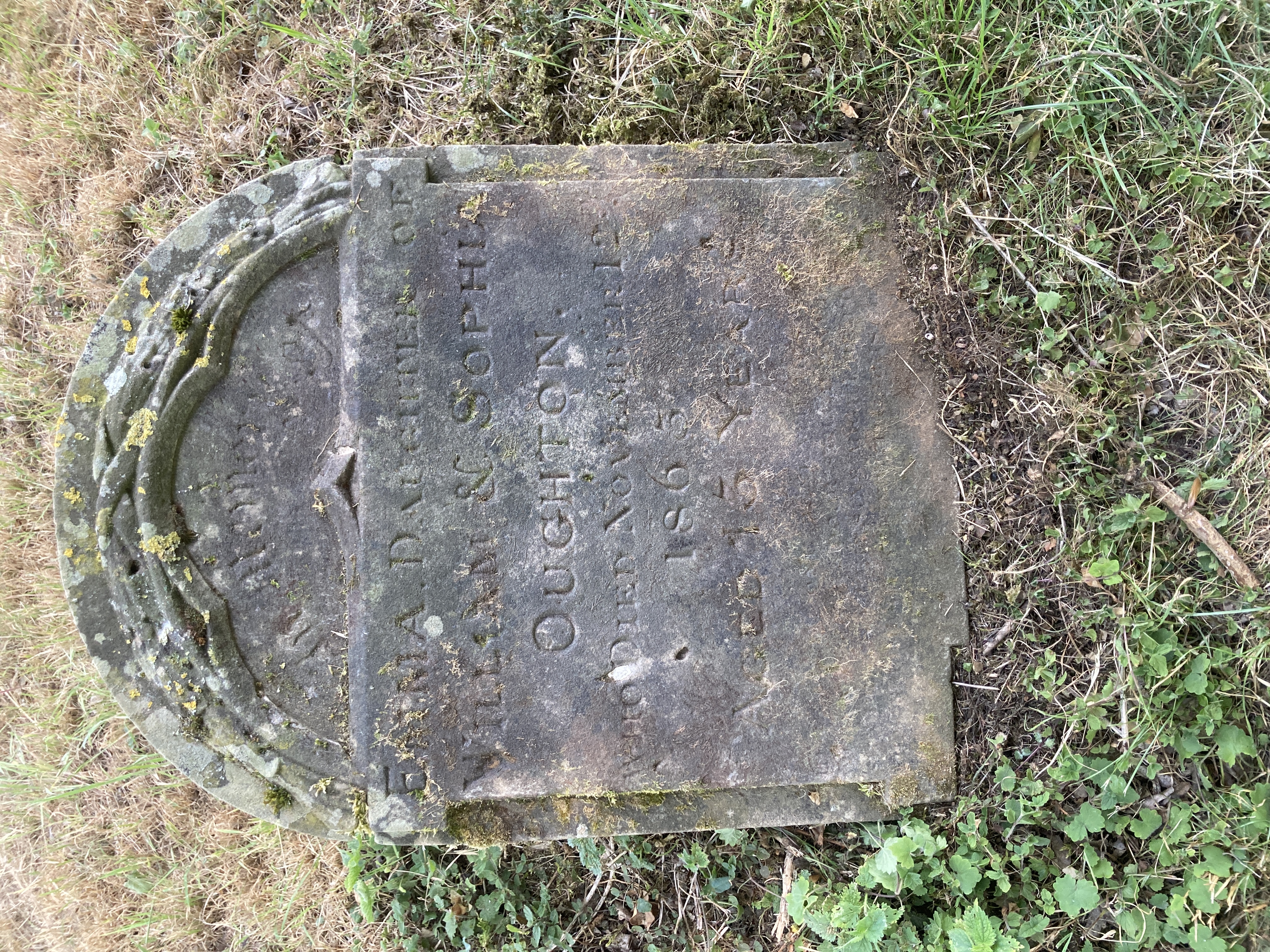
Headstone reads:
In memory of
Emma daughter of
William & Sophia
OUGHTON /
who died November 12
1863
Aged 13 years
The 1871 Census records that William and Sophia had moved to Pensthorpe as Farm Bailiff for Washington Hammond, who farmed the 733 acres there. William (Jnr.) had by then left the family home and was in the employ of Fakenham GP and Surgeon, Alfred Drew and described as “groom”. Further evidence of his working with horses comes to light in the following press cutting from the Lowestoft Weekly Journal for December 30th 1878:
William Oughton, of Great Ryburgh, teamman, was charged by p.-c. Storey, with riding on his waggon without reins to his horses, at Stibbard, on the 22nd November. The officer said that about 9.15, on the evening in question, he heard a conveyance coming, but the night being dark he could not see what it was until it got up to where he stood, and seeing no driver he stopped the horses and looked round in vain for a driver. He then went and obtained a light, and on getting up into the waggon he found the defendant covered up and fast asleep. He roused him up and found he was quite sober, but had anything attempted to pass his waggon an accident might have happened. Defendant now said he had reins, which were fastened to the front of his waggon, but that having been up at four o'clock that morning and been a long journey with a heavy load, which he had himself been obliged to unload, he had, on returning, been overpowered by fatigue and dropped asleep. Having a good character the Bench were disposed to deal leniently with him. At the same time he must be aware that he had run a fearful risk of injuring himself and other persons, as well as doing serious damage to the property of his employer, and he must pay a fine of 10s. and 5s. costs, which Mr. Everitt *at once kindly lent him.
*Isaac Everitt who resided at the new Manor House in Ryburgh was one of the Bench that heard the case that day.
Kelly’s Directory for 1879 now lists William as a grocer and the following press report from July 1880 concerns his operation as a coal merchant; this extra business, together with shopkeeper being confirmed in White’s 1883 Directory:
Walsingham County Court.-July 16.
(Before T. R. BENNETT, Esq., Deputy Judge.)
WILLIAM OUGHTON, of Great Ryburgh, coal merchant v CHARLES MARTIN.-
This case was by the last Court. held at Fakenham, adjourned for the production of witnesses on plaintiff's behalf.-The claim was £5 5s., £3 10s, of which was for coals alleged to have been sold by defendant for plaintiff, and £l 15s. for manure and work done during the harvest of 1879,- Mr. Saunders was for plaintiff, and Mr. Rumbelow for plaintiff (should read defendant.)- Mr. Saunders stated that defendant was engaged to sell coals for plaintiff at the weekly wage of 16s., and, as he was to be responsible for the coals he sold, he was to receive an extra sum of 2s. per week as compensation for his guarantee, -
His Honour: It rests with you to show that this man was a del credere agent.*—
Mr. Saunders: Exactly so: and that I shall prove. -
Mr. Rumbelow: I object to that.-
Mr. Saunders: The man has admitted that he sold the coals and never rendered any account. He certainly was a del credere agent, and as he rendered no account of these coals he must be liable. -
Mr. Oughton, on being sworn, confirmed Mr. Saunders’ statement as to the hire of the man and his guarantee, and proceeded to say.
"He was to take my coals out and sell them. and I agreed to give him 2s, per week extra wage that he might be responsible for them, and pay for what he sold.
On these terms I held him responsible for all he disposed of. He was with me from June 23rd. 1879, to February 3rd. 1880. On Saturday, January 31st., he sold 8 cwt. of coals; on the following Monday, February 2nd., he sold 1 ton 14 cwt.: and on the morning of the next day he sold 18 cwt., and he has never paid me for any of these coals nor rendered me an account of the persons to whom he sold them. At noon time of the Tuesday we had a few words, and he left me and would not go out with the coals any more." -
By Mr. Rumbelow: I gave defendant 18s. per week until the winter, and then I raised his wages to £l, for which he was to guarantee the money for what he sold. I have never received from any person a penny of the money for which he is now sued.-
His HONOUR: The plaintiff swears that the man was not merely a servant, but that he was a del credere agent. This then was a matter of special agreement. But if Mr. Rumbelow calls his client, and he distinctly swears he had no special agreement, it is simply oath against oath. There Is no document on either side.-The defendant, on entering the witness box, said he had been on the road thirty years and never was asked to be responsible for the coals sold. He reckoned himself a daily man. free to leave any right. That if he sold no coals he had nothing to do --And. in reply to Mr. Rumbelow, he swore that he did not receive 2s extra per week as compensation for his guarantee -In the course of a long cross examination, defendant asserted that he had always handed over to plaintiff the money he took, but admitted he had rendered no account of the coals sold. for which he was now sued.-
His HONOUR finally ruled that plaintiff had not proved that defendant was a del credere agent, and non-suited him, with permission to bring another action.
He had subpoened several witnesses who were present, but they were not called upon.
*A del credere agent, or guaranteeing agent, is a person who helps sell goods and promises to pay the seller if the buyer doesn't, making them responsible for the sale.
The 2nd quarter of 1879 was also the year he married Sarah Ann Betts:
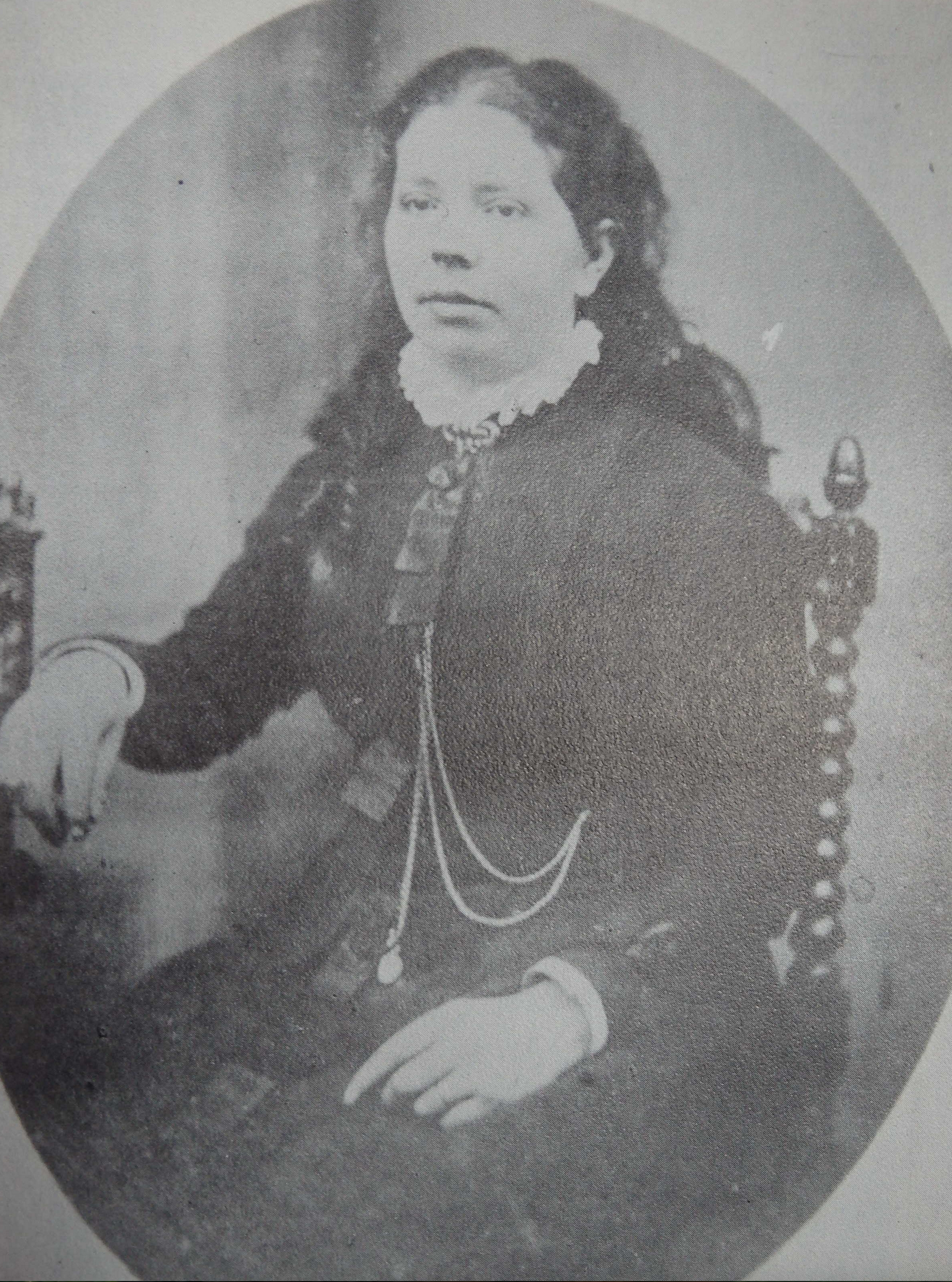
The marriage is found recorded in the official England & Wales, Civil Registration Marriage Index, 1837-1915 under Walsingham. St. Andrews has no record of their marriage and so the most likely explanation was that it either took place at the local Registry Office or at a Primitive Methodist Chapel somewhere locally. William’s mother Sophia was buried by the Primitive Methodist Minister when she died in 1903.The Ryburgh Weslyan Methodist Chapel wasn’t licensed for weddings until 1905 and the Primitive Methodist Chapel, of which William was to later become a Trustee was not opened until 1883.
Looking at Sarah’s background through the Census returns goes some way to explaining William’s career changes of direction from horses to trade:
Sarah was the younger daughter of Edmund and Sally Betts, nee Cocker from Colkirk (where they were married on 9th October 1849). By 1853, they were living in Great Ryburgh when she was baptised at St Andrew’s December 23rd that year. Edmund was the son of Edmund and Mary Betts and he was baptised at the Weslyan Methodist Church on May 20th 1824. The family is recorded as living at “Private Dwelling Fakenham Road” in the Census of 1861, Edmund’s occupation, “Coal Merchant and Tanner.” Ten years later in 1871, still in a house on the Fakenham Rd, “Head “of the household was older daughter Ann Mary together with Sarah and their cousin Mary Betts. All three are described as “Grocer and Draper”. Edmund and Sally were now living in Gateley.
By 1881 living at Ivy Cottage, William and Sarah were now in business as a "Grocer and Draper" and had one son, William Edmund aged 1. The location of the premises, Ivy Cottage is not known but was probably on the Fakenham Road between the Maltings and Westwood Lane and likely operated from a room in the house.
William and Sarah went on to have 7 children:
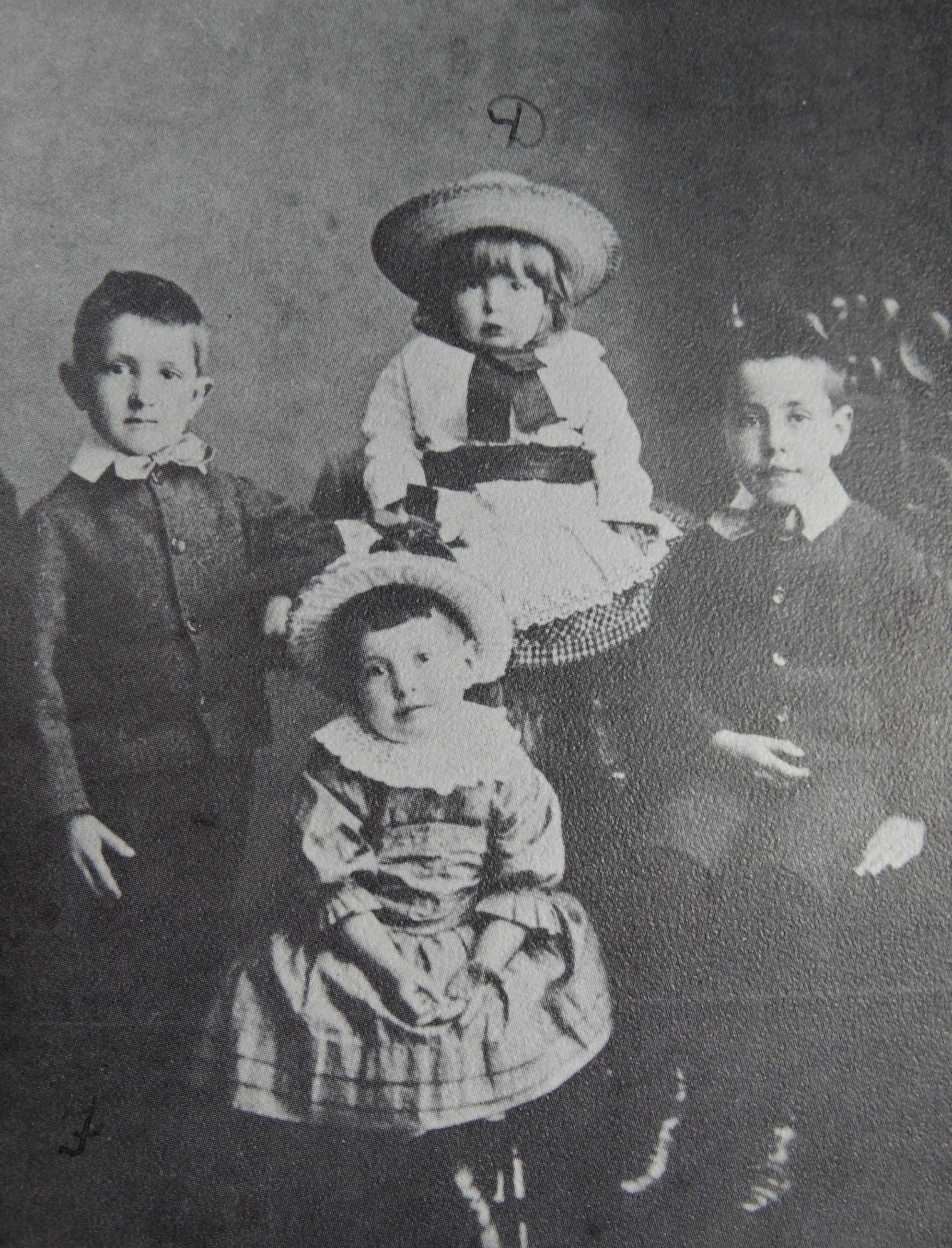
William Edmund 1880-1943
Frank 1882-1964
Mary(Pollie) 1886-1940
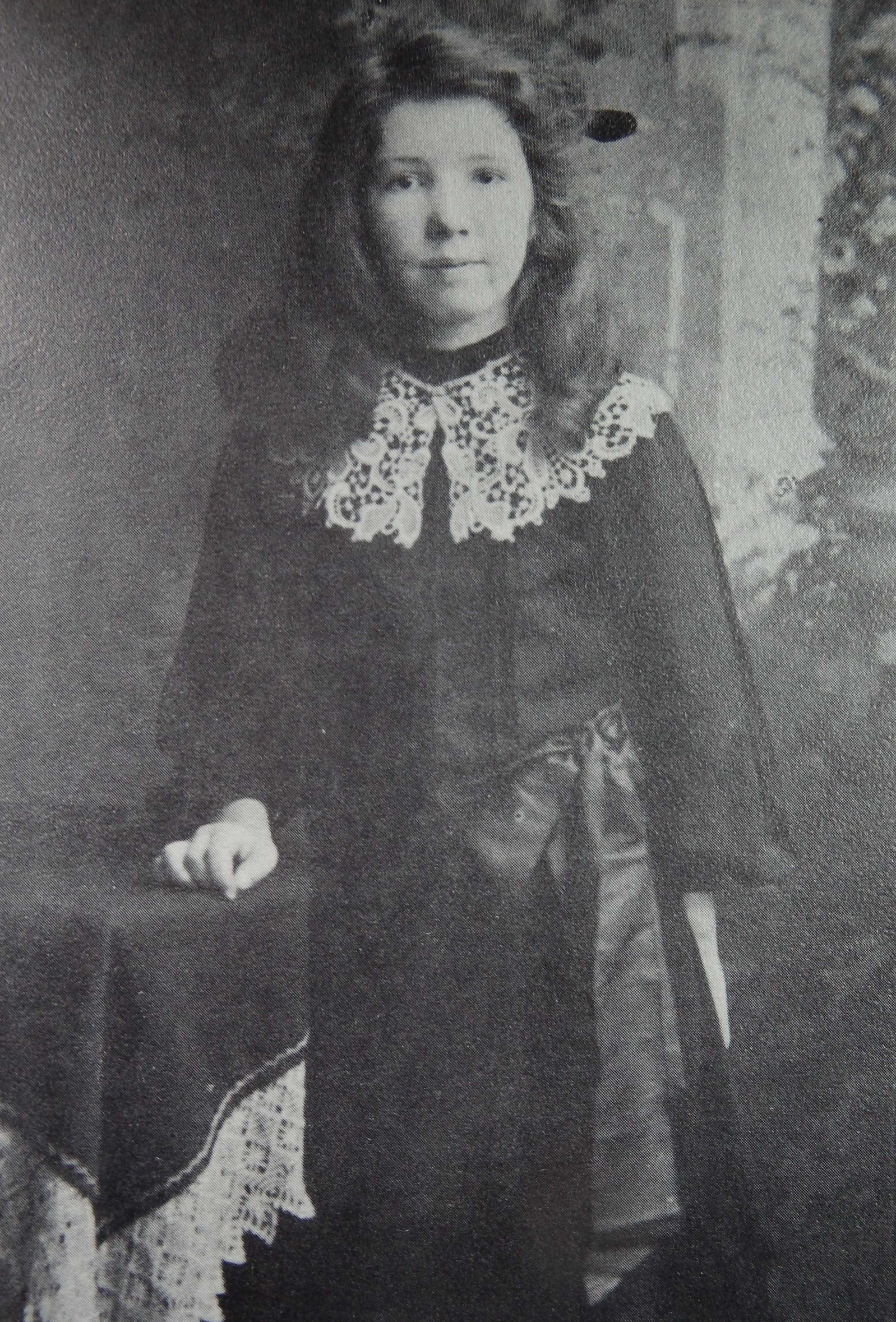
Winifred Ella 1891-1972
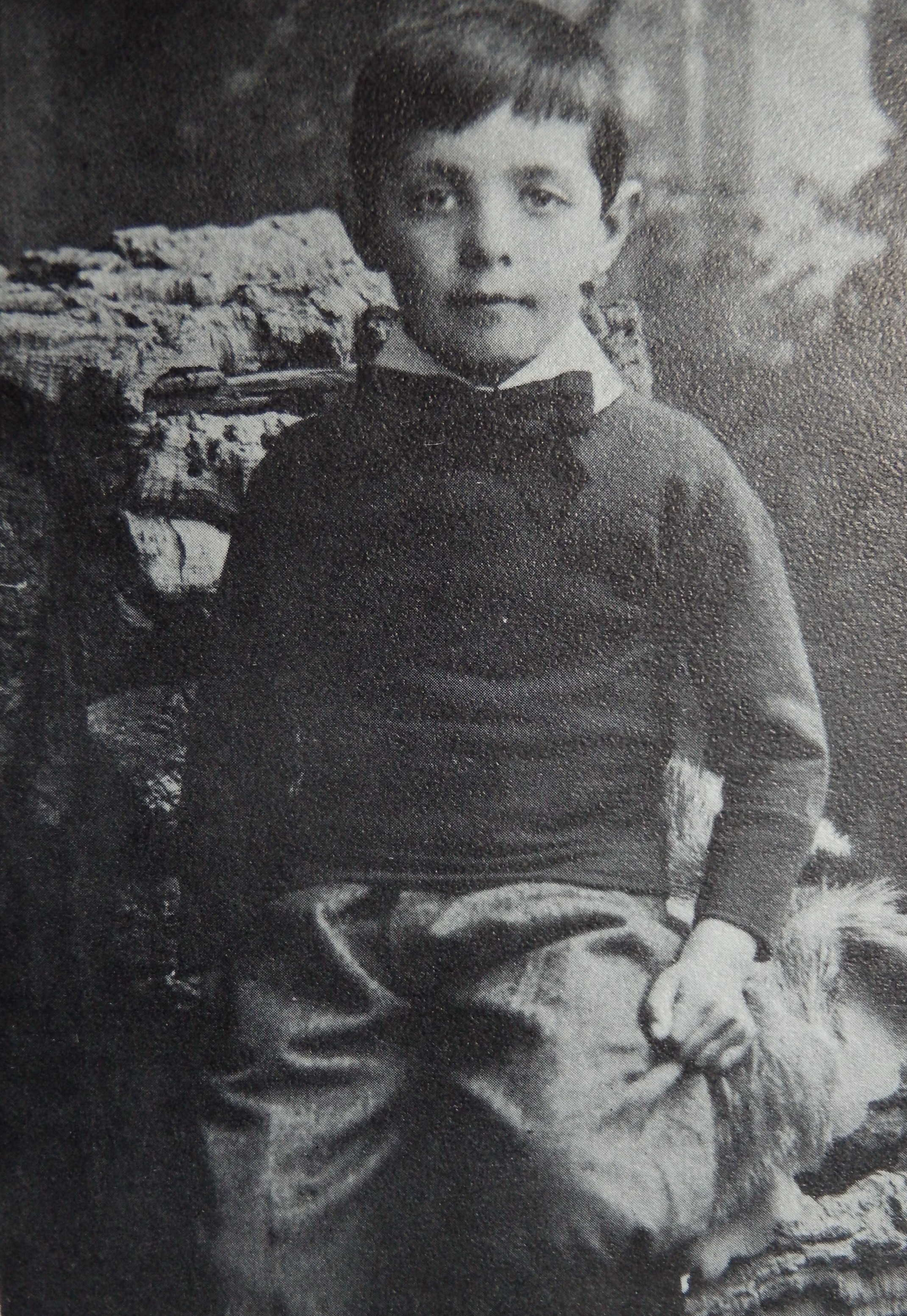
Frederick George 1895-1980
We are already getting the impression of a man unwilling to be taken advantage of and the arrival of Morris Fuller and his very particular attitudes to almost everyone else was probably a catalyst in the evidence of William becoming a more political animal:
Norwich Mercury 18th April 1885
GREAT RYBURGH.
A meeting was held here on Friday under the chairmanship of Mr. Samuel Nicholson for the parishes of Great Ryburgh, Little Ryburgh, and Testerton. The total population of these parishes being 888, the number of delegates to be elected was 2.
The Chairman, in an earnest address, explained the business of the meeting and the necessity for the formation of a Liberal Hundred. Mr. James Emery urged those present to elect delegates in whom they had confidence. Four nominations were then made, viz., Messrs. Wm. Oughton, coal dealer, Samuel Uttin, labourer, Samuel Woods. shopkeeper, and James Long, farmer. The two first-named were elected. A hearty vote of thanks to the Chairman terminated the meeting.
We also see him, in spite of his Dissenting background, being involved in the Vestry, the place prior to Parish Councils where village civil business was conducted As the Ryburgh Scandal was brewing the following benign report appeared in the Norfolk Chronicle on 7th April 1888:
Great and Little Ryburgh.-The annual vestry meeting was held at the parish church on Easter Monday, and the proceedings passed off in a most amicable manner. The chair was occupied by the Rector (the Rev. Morris Fuller), and there were present Mr. Blomfeld of the Manor-house (Rector's church-warden), Mr. Herbert Smith (parish churchwarden), Mr.
Ranger, Mr. Edgar Smith, Mr. Salisbury, Mir. Stark, Mr. Bradley (schoolmaster), Mr. Oughton, Mr. Brown, Mr. Howe (parish clerk), Mr. Ernest Fuller, Mr. Comer, &c.
The Rector, in a complimentary speech as to the way in which Mr. Blomfield had discharged the responsibilities of his important office, re-appointed him as his warden for the ensuing year. Mr. Salisbury then proposed, and Mr Oughton seconded, that Mr. Herbert Smith of the Mill. house be re-appointed the parish warden, which was carried unanimously. The Chairman, after pointing out the necessity of having synodsmen or sidesmen, to take the place of the wardens in their absence, or to carry the offertory bags, appointed Mr Stark (who had had some considerable experience in that office) and Mr. Brown to act in that capacity. Mr. Comer (clerk at Mr. Comer's office) then produced the parish accounts, which showed a satisfactory state of things and a balance in hand. The income for 1887-8 was de£13-1/-6d, making, with other items, a total of £43-16/- 8d halfpenny.
The expenditure included the parish clerk's salary, insurance and rates, repairs, &c., and £30-2/-3d spent in coal for the poorer inhabitants during the winter, leaving a balance of £2-3/-5d halfpenny in the hands of the church. wardens. The customary vote of thanks to the Chairman for presiding brought a pleasant meeting to a successful termination.
The events of the Scandal unfolded in the Spring of 1888 and by November there was much unrest in the village which culminated in the burning of an effigy of Revd, Morris Fuller. This was, it turns out, to have been centered on Fuller’s alleged unjust treatment of William Oughton. The details didn’t surface in the local press, just the outcome, but as in the Scandal, “Village Chronicles” the satirical column of the weekly publication, Daylight filled in the detail in dialect:
November 10th 1888
GREAT RYBURGH.
Bor, ef my tallyfoan arnt mistook thare's anuther religious war a brewin' heer. Parson fare as ef he must be in hot warter wi' his flock insted ov bein' like his dear gude heavenly Marster, an' tryin' tew pour oil on the trubbled warters.
Yow remember, bor, when parson's wife libelled the hoal parish an' got it held up in orl the newspapers as wun ov the werry wicked and immoral places in the wurld. Wal, bor, an inhabitant collected orl the newspaper remarks on the subject intew a pamflet an' sowd it tew fooks an' a werry interestin' pamflet it wos, which everyboddy shood buy jest tew see how it is possibel fur a Minister of God an' his wife tew treet the poor fooks thay reseeve lumpin' gude wages tew preech the Gospel tew.Wall, bor, I'm towd as how Marster Oughton, the shopkeeper, had sum ov the aforesed pamflets tew sell, on hearin' wich parson got riled an' sed Oughton shoont hev nun ov the club people's cards for goods. The tother day wos the time fur distributin' these heer club cards an' my korrospondent, a werry reliable pusson, tell ontew me that parson’s wife left strickt instructions that Oughton warnt on anny account tew hev enny ov the cards. This ‘ere attitude ov parson an’ his wife tewards poor Oughton luke so much like boycottin’ which Balfour & Co. say is sich a horrid crime, that the fooks heerabowt are reglar in a huproar over it, bor.
I ORLSO am given tew onderstand as how when the members ov the clothin' club went fur thare cards, parson giv 'em orl a gude lecksher, an' sed as how all Dissenters are as bad as atheists an' pagans, but I karnt see, bor, how dissenters can be wuss'n a charch Minister of God, and his wife, hew korl thare flock queer names, an' cause bad feelin' amung 'em, hay, bor? Now there's a lot ov Dissenters in the place, so yow can judge wot a werry wicked place it must be in parson's eyes. Parson say he doant know whot we shood be ef thare warn't a minister ov God amung us. Ef parson reckon he's a Minister ov God, I may say as how thare's an oncommon lot ov fooks in the place hew fare as ef they thowt we shood be a lot better ef we hant a Minister of God amung us.
THEY tell ontow me as how Marster Oughton met parson on Tewsday, an' hed a rare row wi' him. Parson, they say, got rite angry, bor, an' pushed Oughton away, sayin' " Git away, how dare yow tawk tew a gentleman like that." Fooks say as how it wos a werry amoosin' site tew see poor Oughton lukin' abowt fur the gentleman parson spook abowt. Howsomever, I'll pull up heer fur this week, but ef I arnt mistook, bor, there's goin' tew be sum funny capers cut heerabowt by parson an' his flock.
November 24th 1888
GREAT RYBURGH.
WAL, bor, wot I foresaw larst week hev happened, the ackshun of parson towards poor Marster Oughton in the matter ov them club cards, hev borne jest the werry fruit every sensible pusson must hev sen it wood.
A hoal willage of Englishmen cant set tamely down tew be libelled orl over the kingdom by even thare parson's wife, an' then hev a respectable tradesman badly tritted intew the bargain. The consekwens wos, that on Saturday nite, bor, there wos a regular hullerbelew heer. The hoal place was up in arms, an' at seven o'clock the effigy of wot they sed was parson, wi' the wurds "Boycotter" laid tenderly across his manly chist, wos werry lovingly placed in a cart and paraded threw the place. Grate Scott, bor, how the fooks ded haller, but when they got neer the Manor House a young bobby, hew evidently dint know his dewty, rushed at the kart an' upset it, and neerly brook a poor fellers knee. This heer ondew interference of the perleese kaused the yewthful kuntry image ov Warrenism tew be insulted. The poor young fewle is werry, whot is called, smock-faced, and a skrastick youngster had the imperence tew tell him tew go hoam and put his whiskers on. Then again, another skrastick chap towd him to go and fry his poor feet, but whether he hev follered this werry excellent advice, I karnt say. Orl I know is that arter sumboddy in the crowd had pointed owt how he wos actin' illegally, he fared to sing werry smorl. But I doant blame bobby, so much as I dew them, hew set a smock-faced yewth wi' everything tew learn, tew rule over his employers the ratepayers.
*****
Wal, bor, orlthow the cart wos upset by Bobby, fooks warnt agoin' tew hev thare fun orltewgether spoilt. They accordingly picked up the figger and carried it tew the allot-ments, whare it wos burnt. I orter say, bor, that flags bearin' a skull and cross boans and the wurds "Coercion is dead,"
wos carried in front of the figger. Parson is orful riled, bor, but he and his wos the fust aggressors, I consider, and the suner he make tracks from the place the better. Jest fancy Parson's Heavenly Marster actin' in the way Parson hev dun wi' regard tew a sheep ov his flock named Oughton! How can Parson, arter his attitood tew his flock, preech consientiusly a sarmon on that bewtiful text, " Blessed are the meek." Arnt it enuff tew make igerant fooks feel as ef religion is nowt but deseet ?
COUNTRY JOHNNY
The “Kart” it transpired in subsequent court case against Morris Fuller belonged to William Oughton “but it was taken without his knowledge”
December 1st 1888
GREAT RYBURGH.
WAL, I'm blarmed, bor, ef we aint a makin’ English History an' no mistake.
Parson an' his better harf hev set a werry pritty avarlansh rollin' which trettin, bor, tew reglar destroy the peace an' quiet ov the place. Bor, larst Satterday nite the place wos inwaded by a forse ov bobbies hew took possession ov the strits an' wos towd orf in kupples tew wotch for summot wot never happened. Bor, when the forse ov bobbies tarned up "hallo," ses sum ov our wiseacres
" heer's a taste ov Balfourism and Crime fur Englishmen. Heer kum the blarmed bobbies tew ewickt us an' lock us up fur barnin' parson's effigy larst week. Wal, things is kum tew a werry pritty parse onder this heer blarmed Tory Government when yow marnt say boo to Balfour in Ireland nor roost the effigay of a parson in England hewse wife hev libelled yow orl over the kuntry withowt bein' ewickted an' locked up. Alars! alars my onhappy kuntry. But, it haint got quite so far as that in Ryburgh yet. It fare as how these heer poor bobbies, bor, wos reglar hoaxed intew wisitin' our saloobrious willage, tew find a mare's nest an' stand larfin at the. young 'uns. Sum wicked wag started the rewmoor as how harf a duzzen effigies wos tew be barnt on Satterday nite an' sumboddy had the bobbies drowed orf from other places tew purwent the bit o' fun. Bor, tawk abowt effigies, Im blarmed ef them poor bobbies dint luke like effigies burnin' wi' shame an' no mistake when they fownd how they'd been tucked in. There they had tew stand an' be charfed by every little wulgar boy hew wos in the secret an' knew as how they'd been made Jerusalem ponies on. Warnt they glad, bor, wen ten o'clock kum an' they reseeved the order tew mizzle from the oncanny place hewse inhabitants burn their parson in effigy. But, bor, it's a sorry bisness tew say the best on it an' I ax parson tew trow up the sponge afore ennything moar serious kum ov it. He an' his wife wos the fust transgressors an' in the name ov his Holy Marster why doant they try tew heal the crewel wound they hev made in Ryburgh social life insted of aggrawatin' on it an' makin it wuss. Its nowt tew be ashamed on in honestly ownin' yow've made a grievous mistake. It oanly show as how yow're wiser tew day than ye wos yesterday. Kum! kum parson dew as I say or prepare tew take yar trot, thare's no middle course, bor.
By 1891 he was in premises rented from Phillip Bell, the Blacksmith at the bottom of Doctor’s Hill, next to the school. This we can work out from other known points in the Census and the direction of the schedule numbering. There is a postcard view dating from post WW1 that shows the shop on the east end of the terrace of three next to the school. Charles Smith, the butcher had a similar premiss on the west end of the houses.
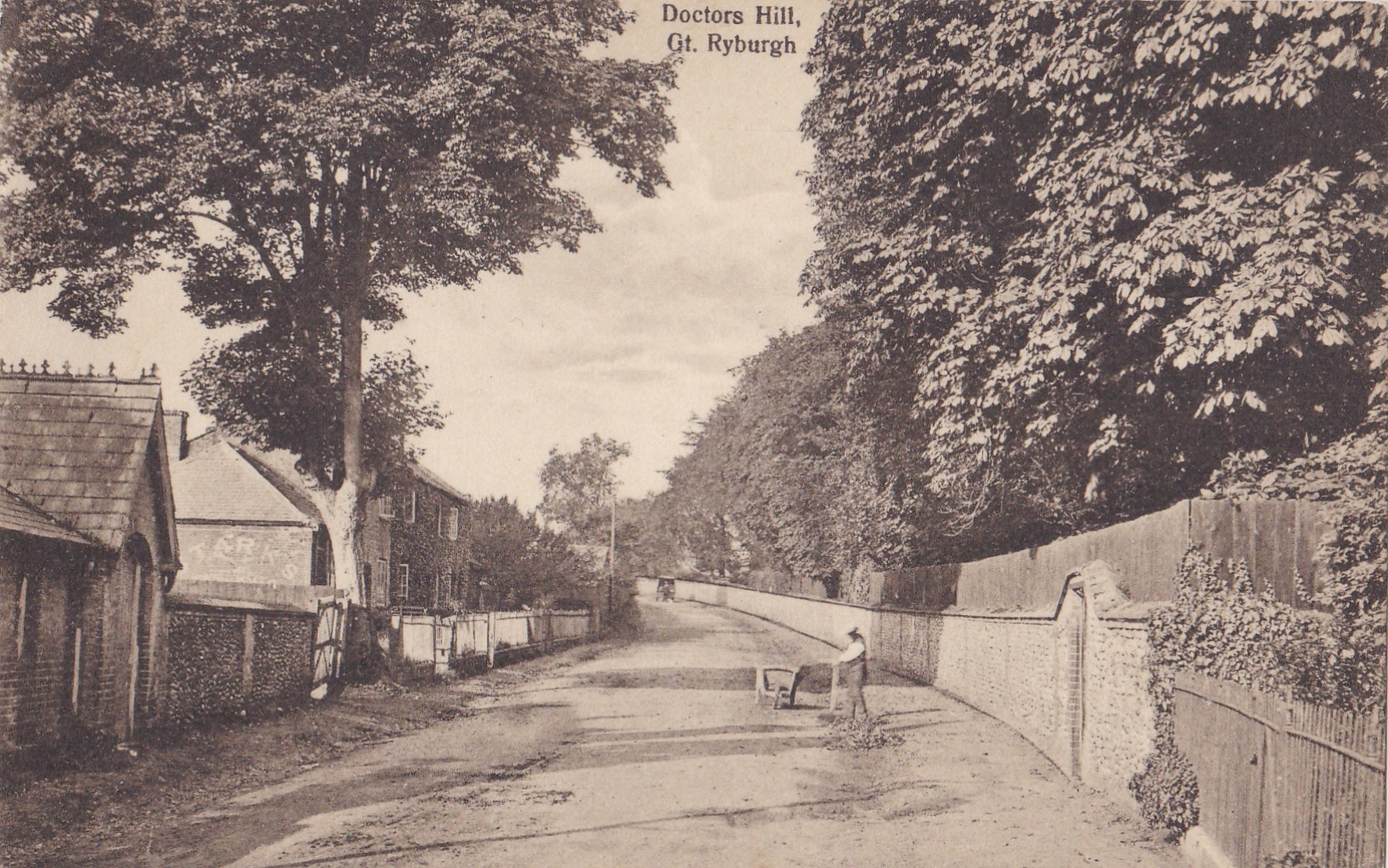
The newspapers have reportage of a difficulty he encountered when moving out of these premises circa 1895 These from the Eastern Evening News on January 19th and the Cromer and North Walsham Post on January 26th. 1895:
BELL V. OUGHTON
This was an action hrought by Philip Bell of Great Ryburgh, blacksmith , against William Oughton of the same place, shopkeeper, to recover the sum of £3 2s. Being £2 10s. Balance of rent and 12s. for damages through the removal of a certain gate and pailings.
The defendant also counter-claimed for the amount of certain slides and fixtures left by him in plaintiff’s". house, Mr. F. Andrews, (Cates, Butcher, & Andrews), Fakenham, appeared for the defendant. Plaintiff denied that he ever agreed to buy the fixtures, and thought when he purchased the property that all the fixtures were included therein.
Isaac Parker, the former owner, stated that the shelving now claimed by the defendant was put in the house at his defendant's own expense, and he thought were to be left by him without any payment when he quitted the house. He admitted, in cross-examination, that there was no gate to the property when he sold it to the plaintiff, and that a certain shed did belong to the defendant. Defendant stated that on the 10th October last he saw plaintiff and paid him part of the rent, and the balance was to go towards paying for certain fixtures which he enumerated, and set a price on, which plaintiff agreed to take. With reference to the plaintiff’s claim for damages for the gate, defendant removed it, as plaintiff refused to allow him for it, he, defendant, having put it up himself. As for the palings, he swore he never removed, nor did he authorise anyone for him to do so. The Registrar finally gave judgement for £2.10s. Balance of rent, but disallowed plaintiff’s claim for damages, He also ordered the plaintiff to deliver the fixtures up to defendant, or to pay the value of the same.
LANDLORD AND TENANT
BELL v OUGHTON. — Phillp Bell, blacksmith, Great Ryburgh, sued Willlam Oughten, shopkeeper, of the same place, to recover £2/10/- balance of rent of a cottage and 12/- damages for having removed a gate and pailings affixed thereto. Mr Andrews appeared for defendant. Against whom judgment was given for the balance of rent. The claim for damages was disallowed, it being proved on defendant's behalf that be himself had erected the gate and had removed it because plaintiff would not make him any allowance for it.
The O.S. map of 1886 shows the likely positioning of the offending gate and palings!
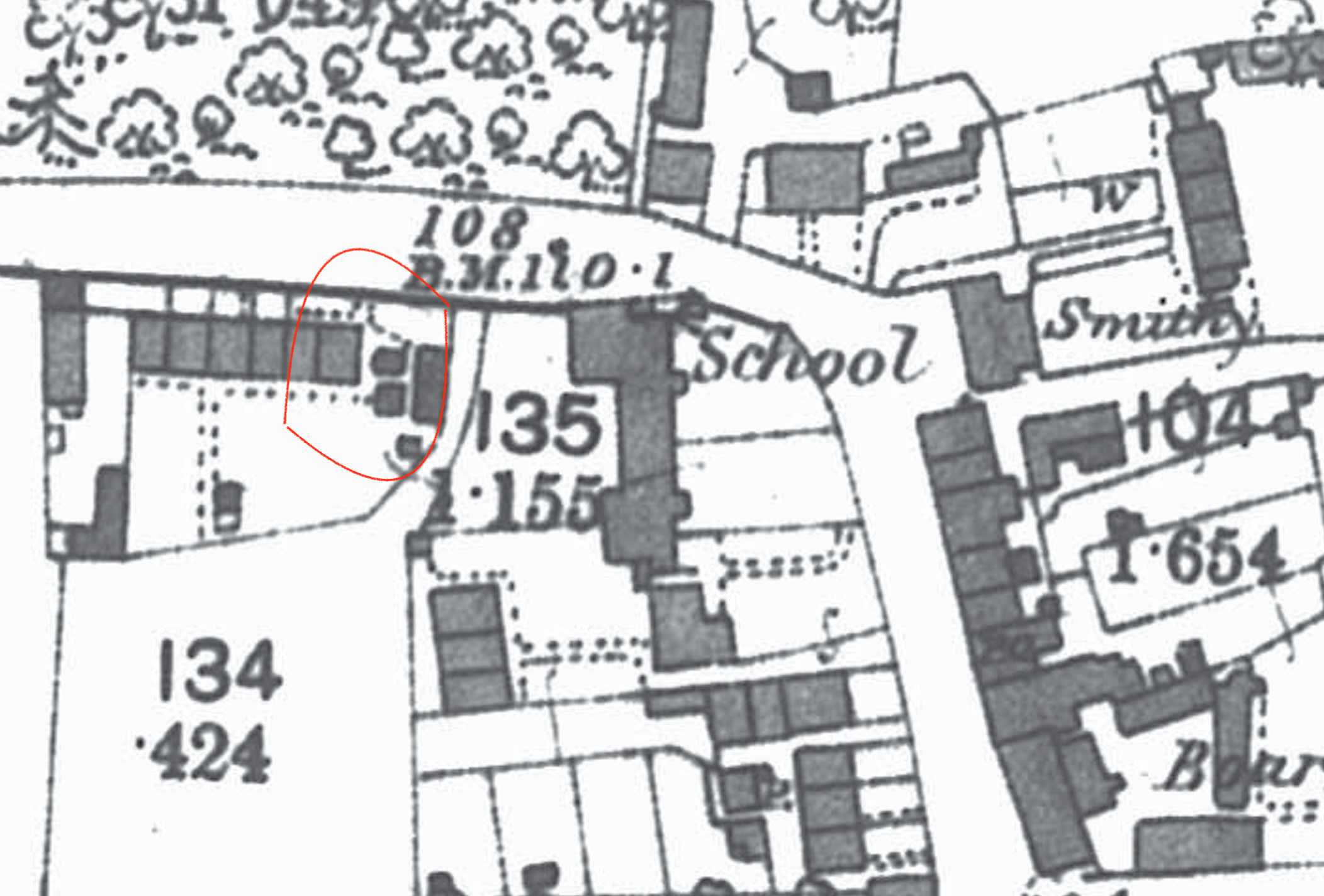
After Morris Fuller left Ryburgh William served on the Vestry between 1890 and 1894 being a joint Overseer with James Waters in 1893 and 1894. Parish Councils were created in 1894 to take the civic part of village life away from the Vestry. He joined the Parish Council in 1895 and served until his death in 1905
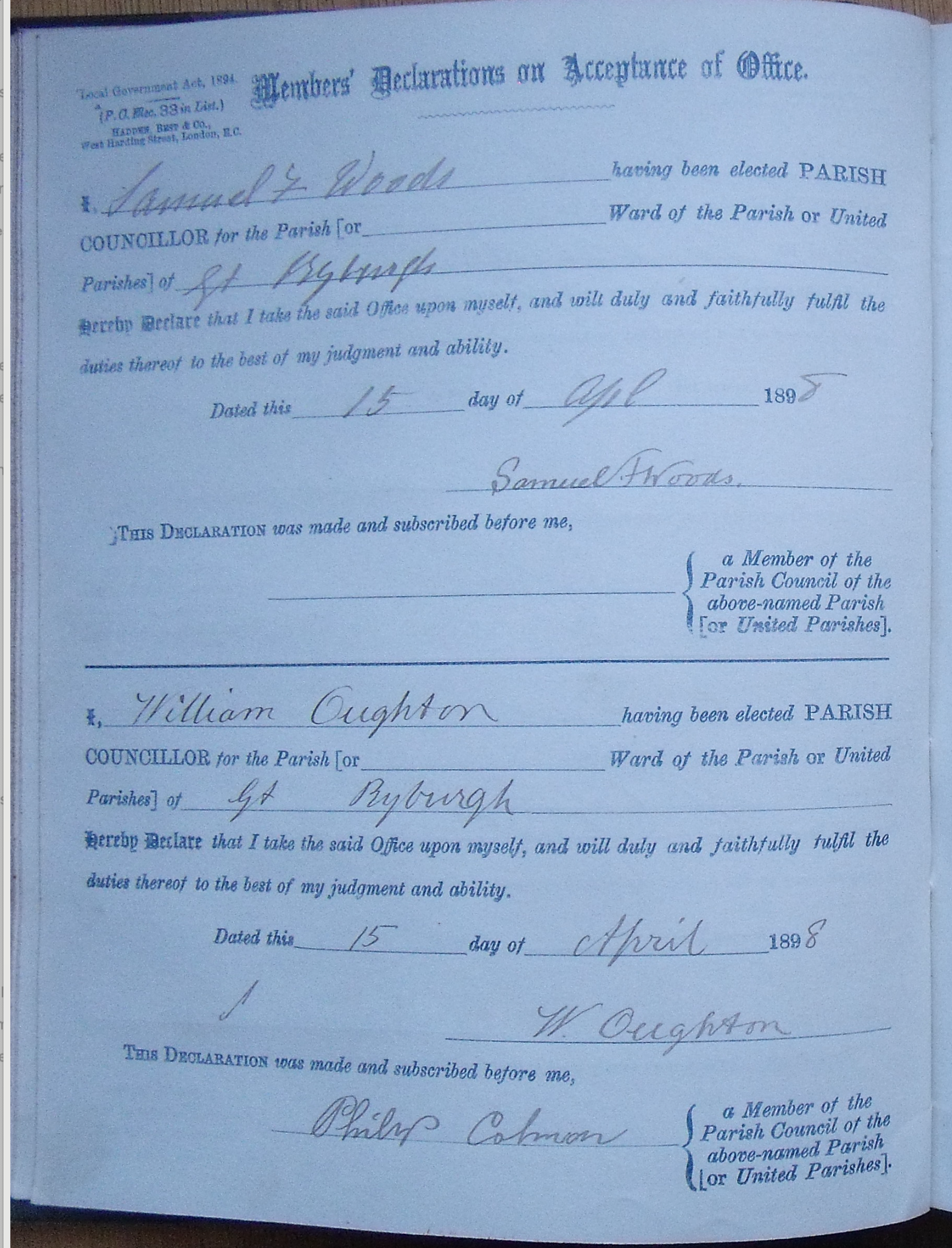
James Waters, William’s co Overseer and fellow Parish Councillor had been responsible for the construction of the new Bake Office in 1880. Following him at the bakery was, first of all James Dilley and then William Oughton, now Baker and Grocer. This is where the family are living in 1901. The two eldest children were no longer at home but the 4 younger ones. Pollie 16, Charlie 14, Winifred 8 and Frederick 6 were either working in the business or at school.
Charles was working for his father as seen here circa 1900 with the bread delivery cart.
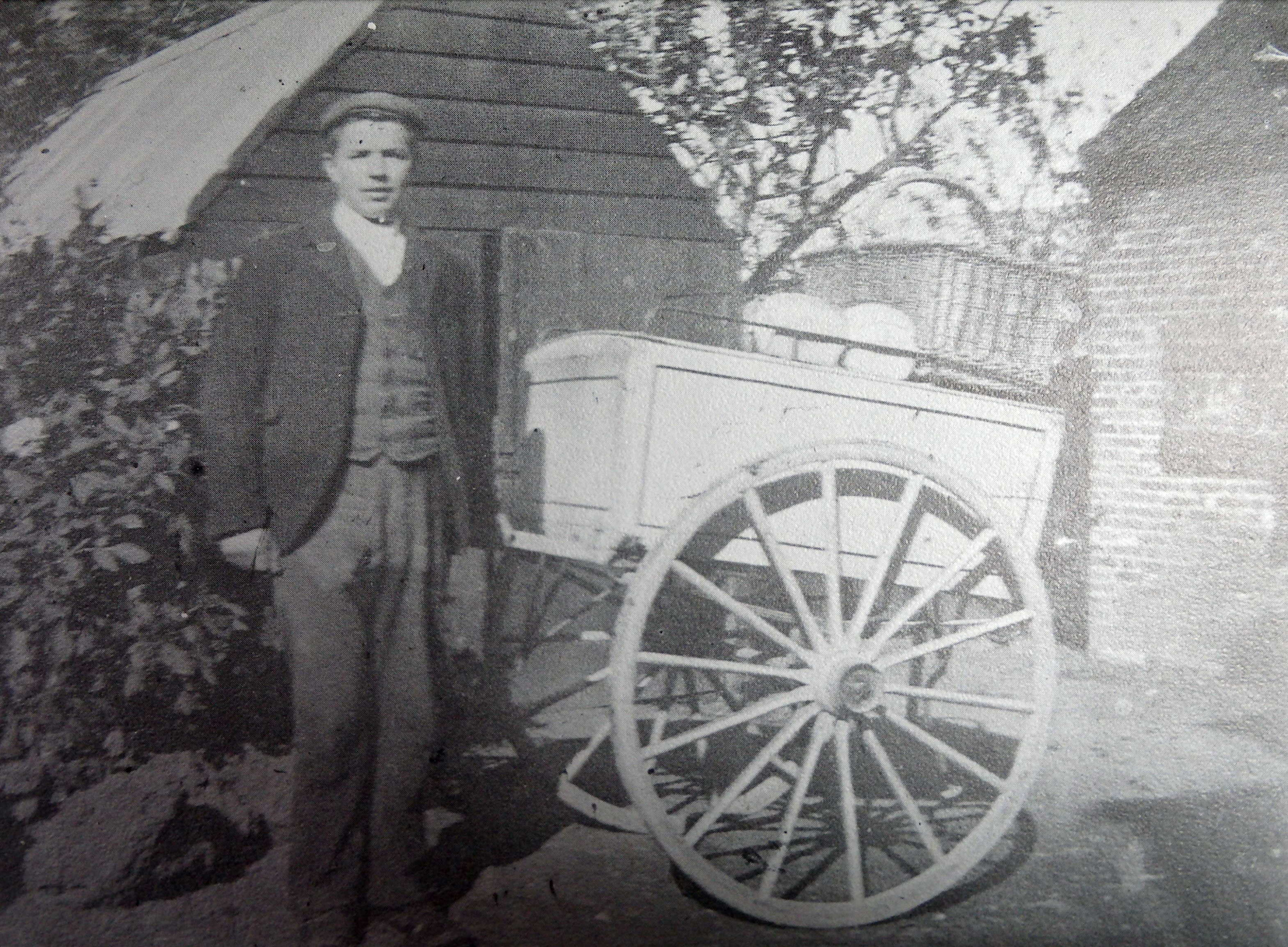
Tragically, life was soon to change for ever in the Oughton family when first Sarah died in January 1903 aged just 48, William’s mother Sophia 88 died in June the same year and she was followed two years later by William age 52 in May 1905.
After the death of their parents it seems as if Charles took on the guardianship of his younger siblings as he is given that role in the school register in Frederick’s entry.
Frederick remained at the school as seen in this team photo of 1907.
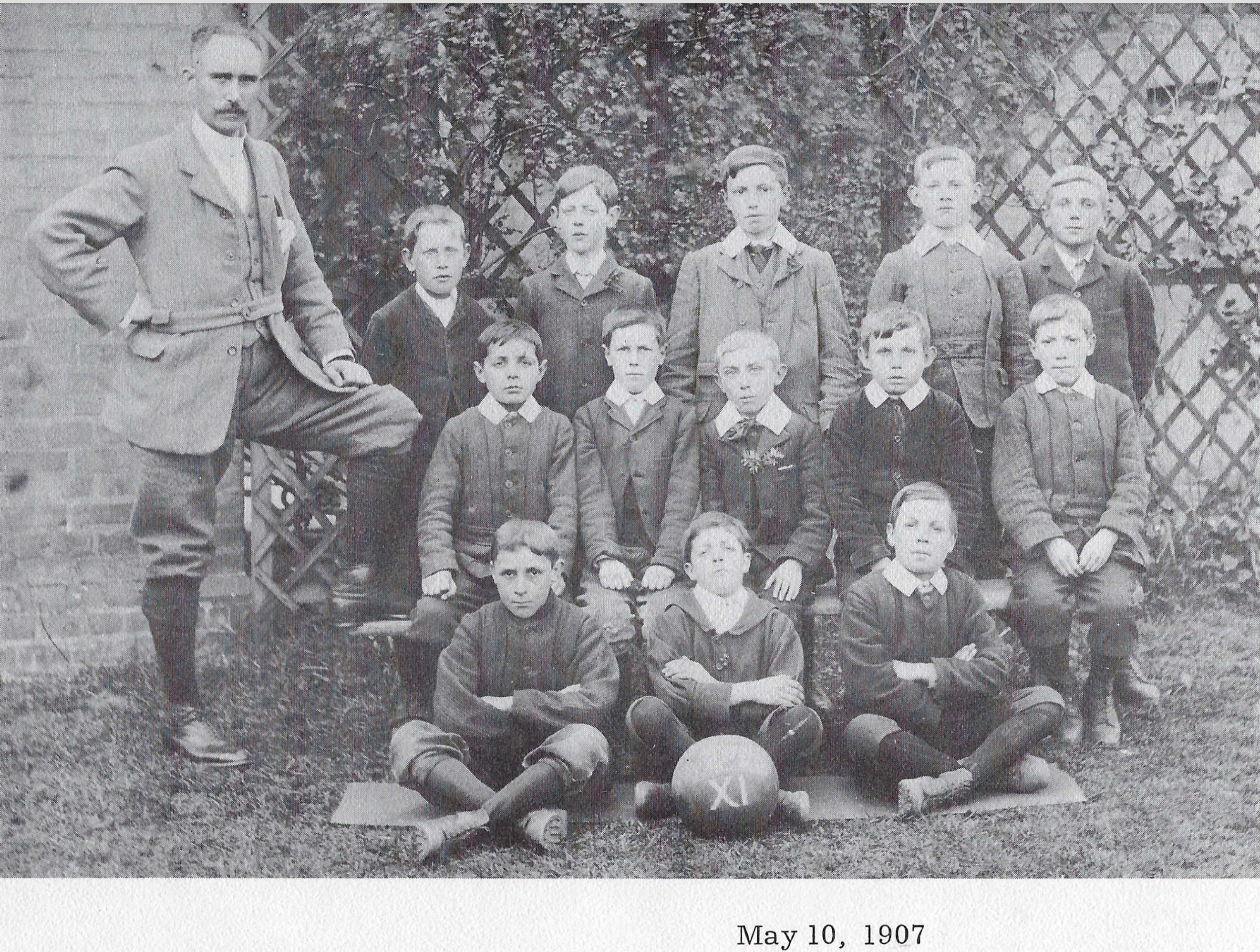
Frederick George Oughton is on the left of the middle row by headteacher, Albert Foster’s knee!
The school register says that he left Ryburgh in August 1908 “removed to London”
The remaining children had all left the village before 1911 where we find in the Census that Winifred was living with Frank and his family and Frederick with William Edmund and his family. These four siblings remained in the UK, Frederick being the nearest to Ryburgh lived most of his life in Hunstanton.
After leaving Ryburgh following his father’s death, Charles, it would seem had been studying for the Methodist Ministry at Cliff College in Calver outside Sheffield. In 1909 he sailed from Liverpool for Philadelphia where he is described as a student on the ship’s manifest. The following year he is described as a preacher/minister living in Michigan.
Mary was working as an assistant matron at an orphanage in Ipswich in 1911 but emigrated in 1914 to Canada. She was met by Charles and went with him to live in Michigan. She is described on the manifest of border crossings as a Deaconess. These two siblings married Americans and remained in the U.S.A. for the rest of their lives.
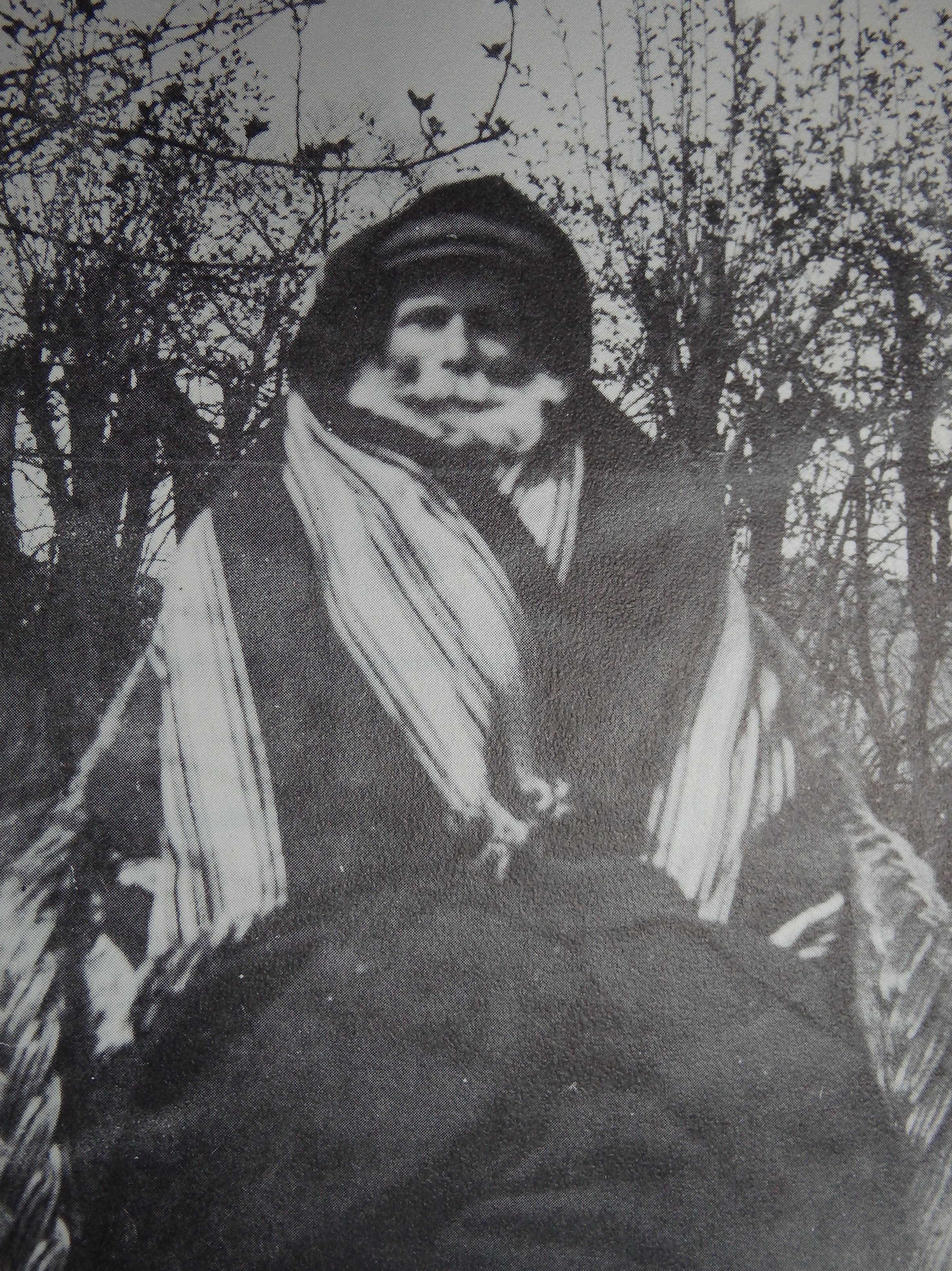
This photo is believed to have been taken shortly before William’s death in 1905.
William and Sarah’s grave in St Andrew’s churchyard:
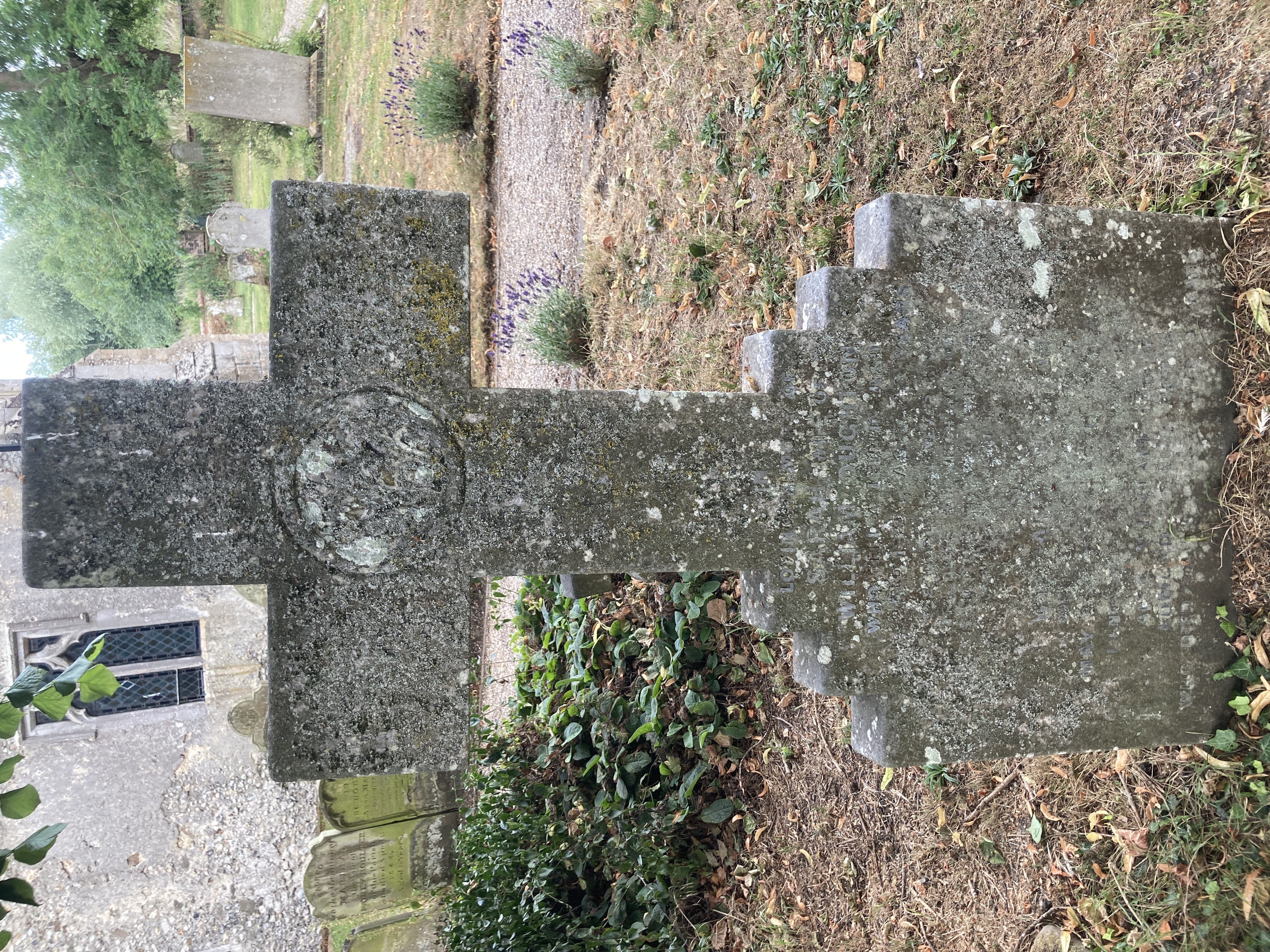
Large cross-shaped headstone reads
In
loving memory of
Sarah wife of
William OUGHTON
who fell asleep in Jesus
Jan 23rd 1903 aged 48 years
The world can never give
the bliss for which we sigh
Tis not the whole of life to live
Nor all of death to die
Also
William OUGHTON
who entered into rest
May 25th 1905 aged 52 years
"I know that my redeemer liveth"
Also William son of
Edmund & Sally BETTS
who died May 16th 1862 aged 3 years
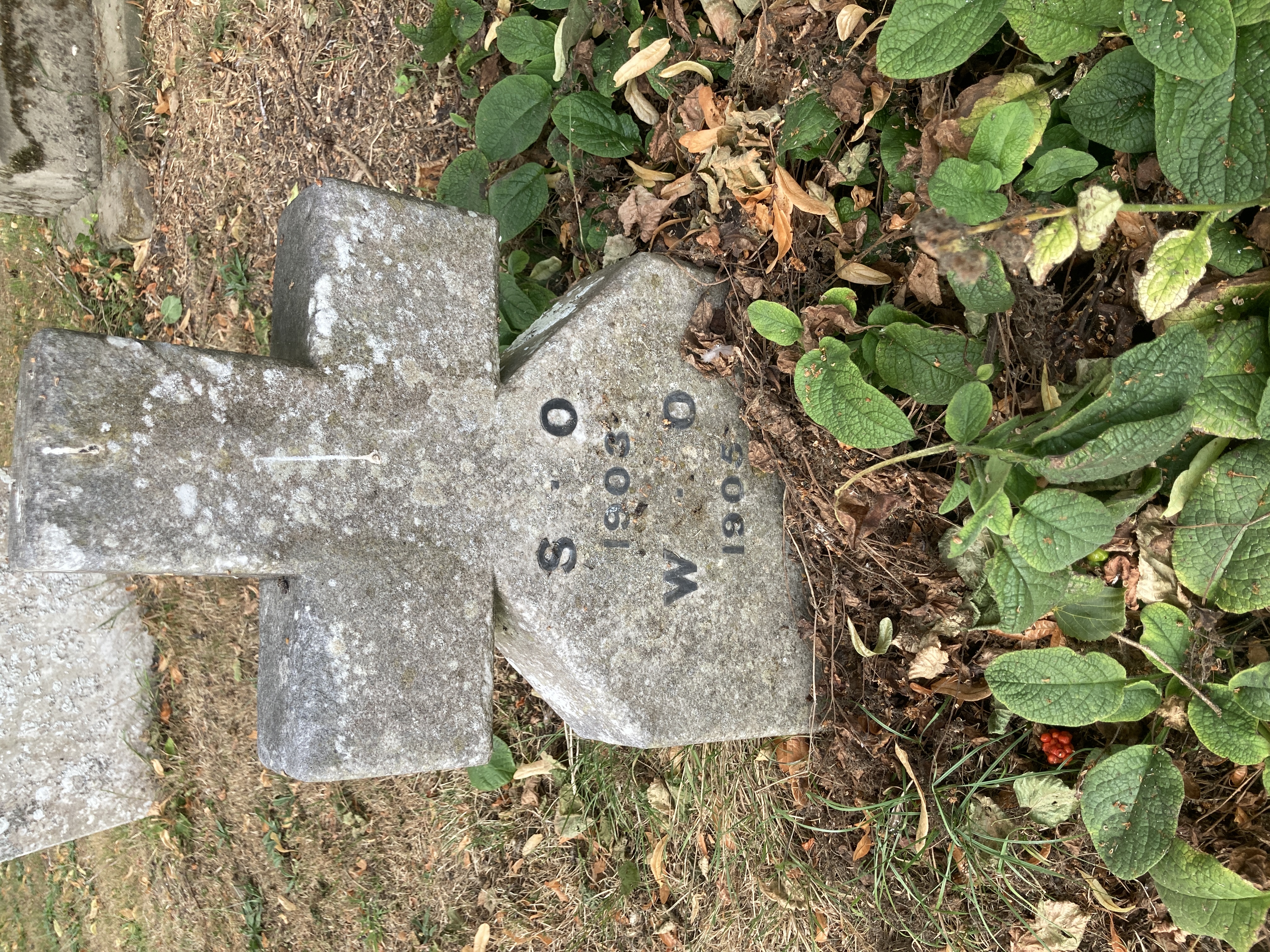
Large cross-shaped footstone reads:
S O
1903
W O
1905
c 2025 Peter Trent
With thanks to Ancestry member Dick Oughton for permission to use some of the images on this page.